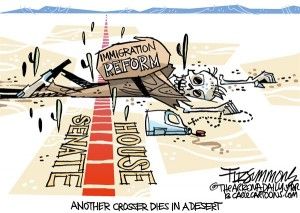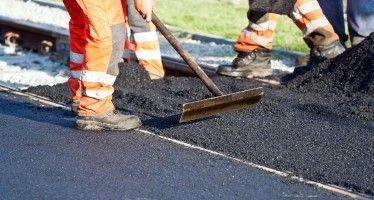Some CA Republicans move Left on immigration

 While several California Republican congressmen have reiterated previous support for comprehensive immigration reform in recent days, it is still unlikely that the House will take up a bill on the matter anytime this year.
While several California Republican congressmen have reiterated previous support for comprehensive immigration reform in recent days, it is still unlikely that the House will take up a bill on the matter anytime this year.
A few days ago, Rep. Jeff Denham of Modesto became the first Republican to embrace the House Democratic plan for immigration reform. Denham’s office released a statement explaining why he decided to co-sponsor HR 15:
“I support an earned path to citizenship to allow those who want to become citizens to demonstrate a commitment to our country, learn English, pay fines and back taxes and pass background checks. This is a common-sense solution to our broken system. I also support a faster pathway for the children who were brought here by their parents through no fault of their own, who have been raised in America and educated in our schools and have no other country to call home.”
Democrats immediately touted Denham’s endorsement as proof that the tides were turning in favor of comprehensive immigration reform being passed in the House sometime this year. Immigration reform advocates also described the move as “important,” “remarkable” and “courageous.”
Denham has also worked with Rep. David Valadao of Hanford to push more Republicans to support the type of immigration reform backed by Democrats, even appearing with outspoken liberal Democratic Rep. Luis Gutiérrez of Illinois to sell the plan.
It is very possible that Denham and Valadao support immigration reform purely on its merits, as many pro-growth organizations, and the business community, have long argued that reform is critical to developing the U.S. economy. But as CalWatchdog recently explained, Denham and Valadao’s political survival is also tied to their support for immigration reform.
Issa’s plan
Rep. Darrell Issa of Vista, one of the most high profile California Republicans, stopped short of embracing the House Democrats’ plan. However, the Oversight Committee Chair has plans to introduce his own version of reform, according to POLITICO.
Issa’s bill would provide legal status for illegal immigrants for six years and would allow those immigrants to travel freely between their home country and the U.S. in that time span. Issa said the plan would allow the government to do a better job accounting for exactly how many people were in the country illegally.
From the POLITICO piece:
“It’s halfway — and it always has been — halfway between full amnesty and simply rejecting people,” Issa told POLITICO on Wednesday. “I think if we’re going to break this logjam that’s occurred for my whole 13 years I’ve been in Congress, we have to find middle ground.”…
Issa’s forthcoming legislation takes elements from similar legislation he introduced in December 2003, the Alien Accountability Act. The six-year period is intended to whittle down the undocumented immigrant population into several categories, such as immigrants with family ties to U.S. citizens or immigrants who want to participate in a guest-worker program.
Although Issa, Valadao and Denham all would like to see some form of immigration reform happen soon, it’s unlikely to occur this year. House leadership has indicated that their focus will be on passing fiscal reforms over immigration, and the recent government shutdown left many Republicans unenthusiastic about compromising with their Democratic colleagues.
Related Articles
Rand Paul road tests campaign themes in CA
In the early search for an edge in 2016, Sen. Rand Paul, R-Ky., has trained his sights on California. Doubling
2nd Amendment groups fight CA gun-control laws in court
As fast as California lawmakers can write new gun-control laws, Second Amendment groups are challenging them in court. buy definition essay
Legislators propose differing plans to fund state-wide highway repair
There is consensus that California’s roads and highways must be fixed. There is no consensus how the fix should




